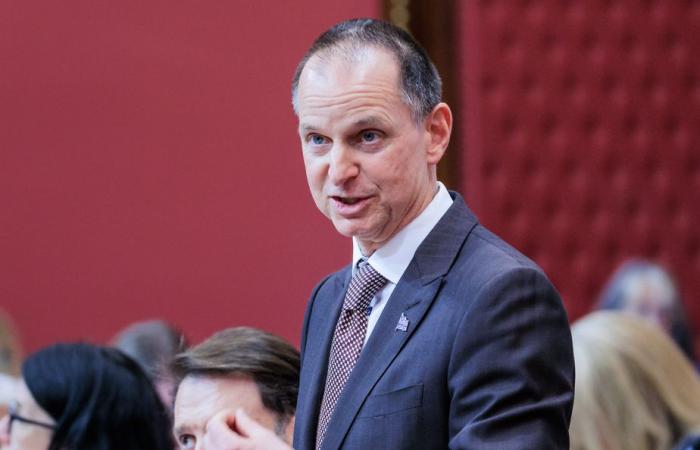(Quebec) To prevent its record deficit of $11 billion from being even bigger, Quebec is emptying half of its contingency cushion. He is starting to clean up his tax expenditures: nearly 200,000 workers aged 60 to 64 will lose $1,000 on average with the increase in the age of eligibility for the tax credit for career extension.
Published at 11:00 a.m.
Updated at 2:16 p.m.
This is what the economic update presented by Finance Minister Eric Girard reveals on Thursday.
In his March budget, he announced a deficit of $11 billion for 2024-2025, after payment to the Generations Fund which is used to reduce the debt. This is a record in absolute numbers. It maintains this target in its economic update, as does the return to a balanced budget in 2029-2030.
However, the Legault government had to take measures to avoid digging its financial hole even further. That’s because spending is increasing more than expected, by nearly $3 billion, the economic update says. The growth in ministry spending thus increases from 4.2% to 6.5% for the current year.
At a press conference, the minister launched “6.5%, nothing to do with austerity! », to respond to some of his detractors. The Liberal Party and the Parti Québécois instead accuse him of having lost control of spending.
Read Five things to know about the economic update
For example, health spending jumps by 900 million compared to forecasts, in particular due to the higher cost of using workers from private agencies. Quebec also had to pay $250 million due to flooding last summer. Some tax credits also cost more than expected. A shift in the pace of infrastructure construction also increases spending by 786 million for the current year. The restrictions making headlines this fall in the health and education sectors are aimed at avoiding larger budget overruns.
“We ask people to respect their budget. We are aware that it is difficult, they are not used to that. During the pandemic, it was unlimited spending,” said Eric Girard.
In the income column, we notice a higher than expected increase in federal transfers, of 1.6 billion. These are sums paid by Ottawa for the reception of asylum seekers and the construction of housing. But tax revenues and those coming from government enterprises like Hydro-Québec and Investissement Québec decrease compared to forecasts, by 600 million and 90 million respectively.
Overall, the government’s financial situation deteriorated by 1.3 billion, an amount which risked further widening its deficit. And that’s without counting the cost of its new initiatives in this economic update, reaching 365 million this year – 2 billion in five years. The biggest measure: the payment of 250 million dollars for transport companies – aid which will total 879.6 million in four years.
To keep the deficit at 11 billion, Quebec draws 750 million from its “contingency provision” which aims to deal with unforeseen events. He now has 750 million left. The increase in capital gains taxation, a measure announced last spring and imitating an announcement from Ottawa, will also bring in $1 billion this year. But instead of reducing the deficit to 10 billion as the minister said in April, this measure has the effect of preventing the hole from widening beyond 11 billion.
The Legault government also announces the start of its cleaning of tax expenditures for individuals. The tax credit for career extension is revised to save 227 million next year – 887 million in four years. The eligibility age increases from 60 to 65, which means that nearly 200,000 workers aged 60 to 64 will lose an average of $1,000. This tax assistance will also be reduced for the better off.
These fiscal measures allow the government to announce that Quebec’s “structural deficit”, the one that will have to be absorbed by 2028-2029, now amounts to 3.2 billion instead of 3.9 billion.
That said, in the shorter term, the outlook is less good. The deficit forecast for next year, therefore in 2025-2026, increases from 8.5 billion to 9.2 billion. It aims to reduce the growth rate of ministerial spending to 2.1% – and to 1.6% the following year.
“The return to more moderate growth in spending” will allow a return to budgetary balance, argued Eric Girard. “We are going to align the growth of expenses with that of income. »
For the minister, the criticisms of his management of public finances are contradictory. “On the one hand, we are accused of spending too much and, on the other hand, we are told that we are imposing austerity. So obviously, these two statements are completely inconsistent,” he said.
As planned, the government will present its plan to return to budget balance in the next budget. It is on this occasion that he will unveil the results of his comprehensive review of tax expenditures, as well as the expenditures of departments and agencies.
Economic growth for 2024 is estimated at 1.2% – instead of the 0.6% anticipated in March. It should reach 1.5% in 2025 according to the Ministry of Finance, but there is “uncertainty”. A “risk,” said Eric Girard. This risk is called Donald Trump. “It is too early to assess the economic effects of the budgetary, regulatory and trade policies of the new American administration,” however said the minister, who has not made any adjustments to his forecasts for the moment.
They said
François Legault is criticized for wasting like a sailor on the run! When the government says the deficit is still $11 billion […]it disguises reality. When he takes provisions to cover part of the deficit which continues to grow and then he takes the old earnings and then puts that on top to go down and then stay at 11 billion, that’s when it disguises the real deficit.
The interim leader of the Quebec Liberal Party, Marc Tanguay
Growth rates [des dépenses des ministères] for the next few years will not ensure the maintenance of services. To maintain system costs, between 3.5% and 4% is required. I wonder where they’re going to cut. It’s starting to look a lot like austerity, and we’ve already seen it for a few weeks […] with budgetary restriction measures.
The spokesperson for Québec solidaire for the Treasury Council, Vincent Marissal
It is one of the governments that will rank as one of the biggest spenders in the history of modern Quebec. […] It is a government that has increased bureaucracy […]who made a whole series of frivolous expenditures, which made it more expensive to manage the state. And in the meantime, what do we do? We are cutting services.
Parti Québécois MP Pascal Paradis






